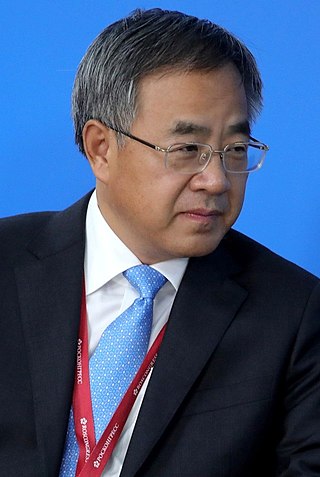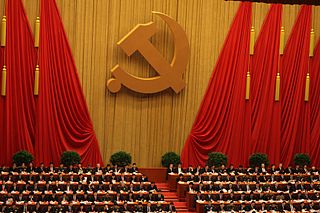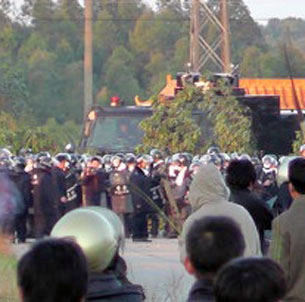
Zhao Ziyang was a Chinese politician. He was the premier of China from 1980 to 1987, vice chairman of the Chinese Communist Party (CCP) from 1981 to 1982, and CCP general secretary from 1987 to 1989. He was in charge of the political reforms in China from 1986, but lost power for his support of the 1989 Tian'anmen Square protests.
Elections in the People's Republic of China occur under a one-party authoritarian political system controlled by the Chinese Communist Party (CCP). Direct elections, except in the special administrative regions of Hong Kong and Macau, occur only at the local level people's congresses and village committees, with all candidate nominations preapproved by the CCP. By law, all elections at all levels must adhere to the leadership of the CCP.

Xi Zhongxun was a Chinese communist revolutionary and a subsequent political official in the People's Republic of China. He is considered to be among the first and second generation of Chinese leadership. The contributions he made to the Chinese communist revolution and the development of the People's Republic, from the founding of Communist guerrilla bases in northwestern China in the 1930s to initiation of economic liberalization in southern China in the 1980s, are numerous and broad. He was known for political moderation and for the setbacks he endured in his career. He was imprisoned and purged several times. His second son, Xi Jinping, is the current President of the People's Republic of China and General Secretary of the Chinese Communist Party.

Lufeng, alternately romanized as Lukfung in Cantonese, is a county-level city in the southeast of Guangdong province, administered as a part of the prefecture-level city of Shanwei. It lies on the mainland on coast of the South China Sea east of Hong Kong.

The government of the People's Republic of China is based on a system of people's congress within the parameters of a unitary communist state, in which the ruling Chinese Communist Party (CCP) enacts its policies through people's congresses. This system is based on the principle of unified state power, in which the legislature, the National People's Congress (NPC), is constitutionally enshrined as "the highest state organ of power." As China's political system has no separation of powers, there is only one branch of government which is represented by the legislature. The CCP through the NPC enacts unified leadership, which requires that all state organs, from the Supreme People's Court to the President of China, are elected by, answerable to, and have no separate powers than those granted to them by the NPC. By law, all elections at all levels must adhere to the leadership of the CCP. The CCP controls appointments in all state bodies through a two-thirds majority in the NPC. The remaining seats are held by nominally independent delegates and eight minor political parties, which are non-oppositional and support the CCP. All government bodies and state-owned enterprises have internal CCP committees that lead the decision-making in these institutions.

Hu Chunhua is a Chinese politician. He currently serves as Vice Chairman of the National Committee of the Chinese People's Political Consultative Conference since 2023. From 2018 to 2023, he served as Vice Premier of the State Council of the People's Republic of China.
The leader of the Central Committee of the Chinese Communist Party is the highest-ranking official and head of the Chinese Communist Party (CCP). Since 1982, the General Secretary of the Central Committee is considered the party's leader. Since its formation in 1921, the leader's post has been titled as Secretary of the Central Bureau (1921–1922), Chairman, and General Secretary.

Zhang Dejiang is a Chinese retired politician who served as the chairman of the Standing Committee of the National People's Congress between 2013 and 2018. He was also the third-ranking member of the Politburo Standing Committee of the Chinese Communist Party from 2012 to 2017.
A Party Committee Secretary is the leader of the Chinese Communist Party (CCP) organization in a province, city, village, or other administrative unit. In most cases, it is the de facto highest political office of its area of jurisdiction. The term can also be used for the leadership position of CCP organizations in state-owned enterprises, private companies, foreign-owned companies, universities, research institutes, hospitals, as well as other institutions of the state.

Wang Yang is a Chinese retired politician who served as the chairman of the National Committee of the Chinese People's Political Consultative Conference from 2018 to 2023. He was also the fourth-ranking member of the Politburo Standing Committee of the Chinese Communist Party from 2017 to 2022.

The 18th National Congress of the Chinese Communist Party was held November 8-15, 2012 at the Great Hall of the People. It was preceded by the 17th National Congress of the Chinese Communist Party. Due to term limits and age restrictions, seven of the nine members of the powerful Politburo Standing Committee (PSC) retired during the Congress, including Hu Jintao, who was replaced by Xi Jinping as General Secretary of the Chinese Communist Party. The Congress elected the 18th Central Committee of the Chinese Communist Party, and saw the number of Politburo Standing Committee seats reduced from nine to seven. It was succeeded by the 19th National Congress of the Chinese Communist Party.

Lu Dingyi was a leader of the Chinese Communist Party. After the establishment of the People's Republic of China and before the Cultural Revolution, he was credited as one of the top officials in socialist culture.
Protesters and dissidents in China espouse a wide variety of grievances, most commonly in the areas of unpaid wages, compensation for land development, local environmental activism, or NIMBY activism. Tens of thousands of protests occur each year. National level protests are less common. Notable protests include the 1959 Tibetan uprising, the 1989 Tiananmen Square protests and massacre, the April 1999 demonstration by Falun Gong practitioners at Zhongnanhai, the 2008 Tibetan unrest, the July 2009 Ürümqi riots, and the 2022 COVID-19 protests.

The Wukan protests, also known as the siege of Wukan, was an anti-corruption protest that began in September 2011, and escalated in December 2011 with the expulsion of officials by villagers, the siege of the town by police, and subsequent détente in the village of Wukan, in the east of Guangdong province. The villagers rose up again in June 2016, but were again suppressed. The most recent rounds of clashes were in September 2016, when the former village leader Lin Zulian was sentenced to jail. The clashes were suppressed.

The Chinese Communist Revolution was a social and political revolution that culminated in the establishment of the People's Republic of China (PRC) in 1949. For the preceding century, China had faced escalating social, economic, and political problems as a result of Western imperialism, Japanese imperialism, and the decline of the Qing dynasty. Cyclical famines and an oppressive landlord system kept the large mass of rural peasantry poor and politically disenfranchised. The Chinese Communist Party (CCP) was formed in 1921 by young urban intellectuals inspired by European socialist ideas and the success of the October Revolution in Russia. The CCP originally allied itself with the nationalist Kuomintang (KMT) party against the warlords and foreign imperialist forces, but the 1927 massacre of Communists in Shanghai ordered by Kuomintang leader Chiang Kai-shek forced them into the Chinese Civil War, which would last more than three decades.
The organization of the Chinese Communist Party (CCP) is based upon the Leninist concept of democratic centralism.
Lin Ruo (Chinese: 林若; pinyin: Lín Ruò; July 19, 1924 – October 7, 2012) was a Chinese politician who served as Party Committee Secretary of Guangdong Province.
Socialism in Hong Kong is a political trend taking root from Marxism and Leninism which was introduced to Hong Kong in the early 1920s. Ever since the Chinese Communist Party adopted economic reforms from 1978, young socialists have largely moved towards the pro-democracy camp under the banner of social democracy while traditional leftists still remain in the pro-Beijing camp.

Zheng Yanxiong is a Chinese politician currently serving as director of the Hong Kong Liaison Office and secretary of the Hong Kong Work Committee of the Chinese Communist Party. Previously, he was the director of the Office for Safeguarding National Security of the CPG in the HKSAR. Zheng is known for controversial statements denouncing foreign media reporting on the Wukan protests in Shanwei in 2011, and for the crackdown of renewed protests in Shanwei in 2016.












